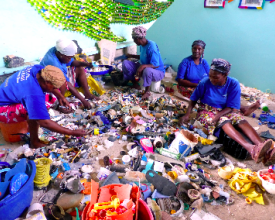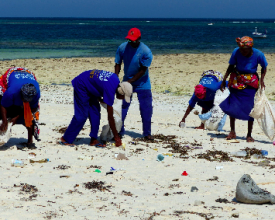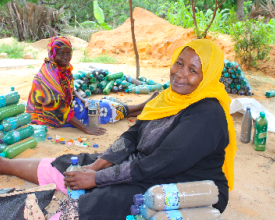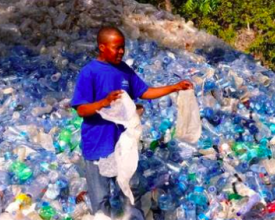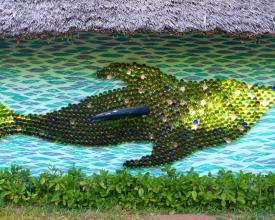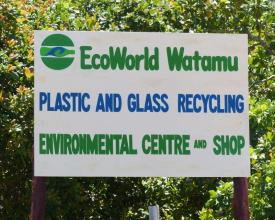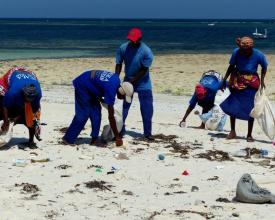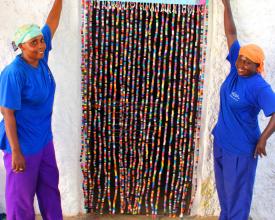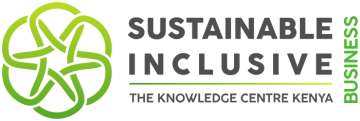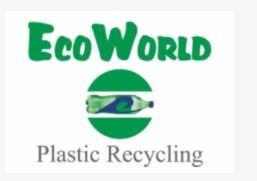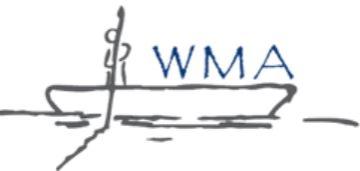
From Waste to Products: Maximising impacts of community-based plastic enterprise in Watamu, Kenya
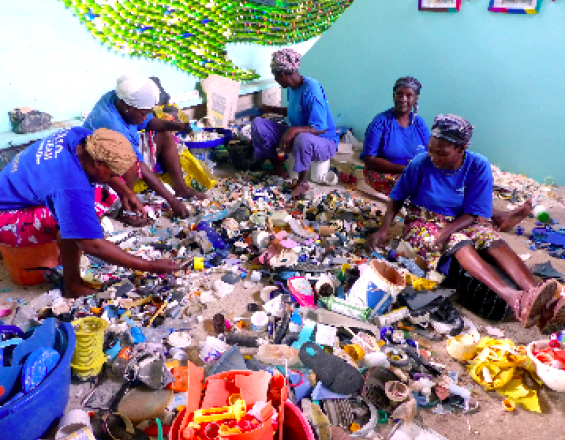
Watamu Marine Association (WMA) is a unique initiative at the Kenyan coast bringing together members from the community, tourism and environment sectors. WMA promotes community development and empowerment, and advocates for the protection and preservation of Watamu Marine Park and Reserves. WMA is exploring participatory and co-management potential with the managing authorities and agencies. WMA promotes member groups, business ventures and partner projects in Watamu and the surrounding areas.
The project has created a dynamic plastic waste value chain between the local community and tourism industry. This created jobs for recyclers and part-time income for the community beach-cleaning teams, and provides an environmental service to hotels. The project now plans to expand its operations to the larger neighbouring coastal towns of Malindi and Kilifi, targeting a population of more than 400,000 people along a 70 km stretch of coastline. All hard plastic waste is machine crushed at Eco-World Recycling in Watamu.
Contexto
Défis à relever
- The ever increasing volume of unrecyclable marine litter impacting kenyan beaches as well as the lack of county government enforcing of waste management regulations.
- The large volume of recyclable plastic waste going to dump sites and not reaching the value chain due to either being incompatible chemical components.
- Informal waste picker sector working without infrastructure and government recognition or support. Waste pickers for a long time, have been side-lined from development due to the negative perception about this occupation (outcast).
- Lack of investment and support from Kenya Association of Manufacturers (KAM) and Kenya PET Recycling Company (PETCO) for community-based circular economy enterprises that are doing much to remove plastics from their members.
- Lack of investment from County Government in providing infrastructure, facilities, and conducive conditions to help develop community-based waste management, including enforcing waste management regulations i.e. collection, transport etc.
Ubicación
Procesar
Summary of the process
Partnering with hotels to source waste and training hotel staff on best waste management and segregation practices was imperative in organizing circularity as well a plastic value chain through the collection, storage, and transport logistics within Watamu, Malindi, and Kilifi. Investing in Eco-World recycling machinery, transport systems, and up-scaling and expanding operations was critical in that infrastructure was missing to handle large volumes of waste collected. Also, training community members on how to make up-cycled products of value was complimented by enhancing advocacy efforts to improve waste management policies in the County including championing education and awareness on waste management best practices and showcasing circular economy opportunities
Building Blocks
Partnerships
Creating dynamic plastic waste value chains through collaboration between local community groups (youth, women) and the hotel industry. Where community groups collect and sort the waste. The value of partnership is very critical in ensuring streamlining circularity as well as ensuring synergies are pulled concertedly.
Enabling factors
Partnering with hotels to source recyclable waste and training of hotel staff on best waste management was factor that accelerated organizing plastic waste collection, storage, and transport logistics within Watamu, Malindi, and Kilifi
Lesson learned
There is value in creating meaningful partnerships through capacity building and providing incentives in creating circularity on waste management through training, dialogue, and engagement for the stakeholders to maximize their impact.
Infrastructural development
The established plastic treatment facility is very critical in developing pellets that were used to developed plastic upcycled products that were later sold as artifacts.
Investment in a waste collection vehicle to increase collection of plastic waste and expand operations of ramping up waste collection.
Enabling factors
The availability of an established plastic waste value chain provided the raw material for the facility as well as partnerships ramped up waste from the hotels including training community groups to be waste management champions via Beach clean-ups and waste pickers.
Lesson learned
Finding a market for the plastic pellets is very critical in providing sustainability of the plastic value chain and thus creating circularity in the plastic waste management mix that might involve upcycling, down cycling and treatment.
Creation of employment
Creating plastic waste value chains by paying waste pickers per kg of plastic collected has created enterprising youth and women groups that have been able to eke a living as well as enhanced savings through micro finance facilities resulting in improved living standards.
Enabling factors
Trained community groups have been able to become champions on circular economy as well as becoming agents of change through beach clean-ups as well as maintaining waste collection points.
Lesson learned
The creation of employment must be complemented with training on the circular economy. This two lessons must complement one another in order to create a platform where circularity is accepted, understood and implemented.
Up-cycling plastic waste
The process of upcycling plastic waste to make products of value such as jewellery and sculptures is truly valuable. It requires one to assess the whole plastic value chain to identify the gaps, opportunities and pain points in order to plan accordingly.
Enabling factors
Hotels and the general tourism sector in Watamu have provided a ready market for such products as well as training of community groups on artistry and connected them to business financing enterprises.
Lesson learned
Create a favourable ecosystem for the products to access markets as well as partnering with financing institutions to enhance capacities of community groups on savings and investment.
Impacts
- Procurement of a waste collection vehicle to transport plastic waste and marine litter collected within Watamu and its neighbouring towns to recycling facility.
- Procurement of PET crusher machine for processing plastic waste bottles that process 2 tonnes of plastic per day.
- 100 waste pickers from disadvantaged women and youth groups were able to get decent employment and earn a weekly income from the project by participating in the sponsored “Cash 4 Trash” beach clean-ups.
- Placement of large plastic waste collection containers in Watamu and Malindi towns for public use and to raise awareness on waste segregation at source including assisting the county government in enforcing waste management.
- Procurement of an injection moulder for making marine litter plastic keyrings and fridge magnets for sale at the Eco World shop consequently ensuring income and decent living for the workers at the factory.
- Collected over 33 tons of marine litter collected from the Watamu Marine Park and beaches since Jan 2020.
- Trained over 30 local community artisans on how to make up-cycled products from fishing gear and flip-flops marine litter.
- 4 key stakeholder meetings held in Watamu and Malindi to discuss ways in which we can strengthen and develop circular economy partnerships and collaborative processes between civil society, government, and private sector in the project area.
Beneficiaries
- Local community groups: Women’s and youth groups receiving an income as beach cleaners and plastic pickers.
- County Government through assistance with marine litter management.
- CBOs NGOs, enterprises through training, knowledge sharing.
Sustainable Development Goals
Story
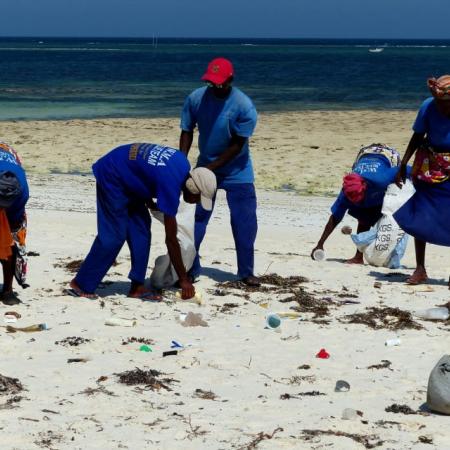
Malindi Watamu National Marine Park and Reserve's status has been renewed as an International UNESCO Designated Biosphere Area.
Watamu Marine Park and Reserve deserve extra protection, it's official! Assisted by representations from Watamu Marine Association members including a Rocha Kenya WMA's chair Justin Kitsao representing the Malindi Watamu area argued for a renewal of its internationally protected status. Justin lobbied UNESCO in Tanzania last year and campaigned to extend the protected area to Arabuko Sokoke Forest. UNESCO deliberated for almost a year and finally granted the extension, although the Forest is still being deliberated on. Since 1968 Malindi Watamu Marine Park and Reserve has been protected nationally, as a home for sea turtles, whales, dolphins, coral reefs and an abundance of fish life. Not forgetting Mida Creek and the vital role it plays as a nursery for marine life and hundreds of species of birds. Most certainly Watamu is an important area ecologically. Watamu Marine Association worked together with Kenya Wildlife Service and Kenya Forest Service and in mid-September 2015 were involved in final handing over the management manual for UNESCO Biosphere Reserves in Africa, Justin Kitsao represented Malindi Watamu Biosphere reserve in Dar e Salaam in Tanzania who developed the document. Hosted by Turtle Bay Beach Club. Thanks also to help and support from Biosphere Twin North Devon Biosphere Sharing experiences and understanding is an important function for the worldwide Biosphere Reserve network. "North Devon's Biosphere Reserve has twinned with Malindi-Watamu Biosphere Reserve in Kenya so we can learn from one another about how to adapt to a world of climate change, sea-level rise and coastal erosion. The intention is to twin the communities not just the co-ordinators or management groups. Representatives from Malindi have visited North Devon and vice-versa."
